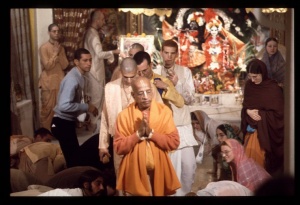CC Madhya 19.143: Difference between revisions
m (1 revision(s)) |
(Vanibot #0054 edit - transform synonyms into clickable links, which search similar occurrences) |
||
| (One intermediate revision by one other user not shown) | |||
| Line 1: | Line 1: | ||
{{ | [[Category:Sri Caitanya-caritamrta - Madhya-lila Chapter 19|C143]] | ||
<div style="float:left">'''[[Sri Caitanya-caritamrta|Śrī Caitanya-caritāmṛta]] - [[CC Madhya|Madhya-līlā]] - [[CC Madhya 19|Chapter 19: Lord Śrī Caitanya Mahāprabhu Instructs Śrīla Rūpa Gosvāmī]]'''</div> | |||
<div style="float:right">[[File:Go-previous.png|link=CC Madhya 19.142|Madhya-līlā 19.142]] '''[[CC Madhya 19.142|Madhya-līlā 19.142]] - [[CC Madhya 19.144|Madhya-līlā 19.144]]''' [[File:Go-next.png|link=CC Madhya 19.144|Madhya-līlā 19.144]]</div> | |||
{{CompareVersions|CC|Madhya 19.143|CC 1975|CC 1996}} | |||
{{RandomImage}} | |||
==== TEXT 143 ==== | ==== TEXT 143 ==== | ||
<div | <div class="verse"> | ||
aparimitā dhruvās tanu-bhṛto yadi sarva-gatās | :aparimitā dhruvās tanu-bhṛto yadi sarva-gatās | ||
tarhi na śāsyateti niyamo dhruva netarathā | :tarhi na śāsyateti niyamo dhruva netarathā | ||
ajani ca yan-mayaṁ tad avimucya niyantṛ bhavet | :ajani ca yan-mayaṁ tad avimucya niyantṛ bhavet | ||
samam anujānatāṁ yad amataṁ mata-duṣṭatayā | :samam anujānatāṁ yad amataṁ mata-duṣṭatayā | ||
</div> | </div> | ||
| Line 14: | Line 18: | ||
==== SYNONYMS ==== | ==== SYNONYMS ==== | ||
<div | <div class="synonyms"> | ||
''[//vanipedia.org/wiki/Special:VaniSearch?s=aparimitāḥ&tab=syno_o&ds=1 aparimitāḥ]'' — unlimited in number; ''[//vanipedia.org/wiki/Special:VaniSearch?s=dhruvāḥ&tab=syno_o&ds=1 dhruvāḥ]'' — eternals; ''[//vanipedia.org/wiki/Special:VaniSearch?s=tanu&tab=syno_o&ds=1 tanu]-[//vanipedia.org/wiki/Special:VaniSearch?s=bhṛtaḥ&tab=syno_o&ds=1 bhṛtaḥ]'' — who have accepted material bodies; ''[//vanipedia.org/wiki/Special:VaniSearch?s=yadi&tab=syno_o&ds=1 yadi]'' — if; ''[//vanipedia.org/wiki/Special:VaniSearch?s=sarva&tab=syno_o&ds=1 sarva]-[//vanipedia.org/wiki/Special:VaniSearch?s=gatāḥ&tab=syno_o&ds=1 gatāḥ]'' — all-pervading; ''[//vanipedia.org/wiki/Special:VaniSearch?s=tarhi&tab=syno_o&ds=1 tarhi]'' — then; ''[//vanipedia.org/wiki/Special:VaniSearch?s=na&tab=syno_o&ds=1 na]'' — not; ''[//vanipedia.org/wiki/Special:VaniSearch?s=śāsyatā&tab=syno_o&ds=1 śāsyatā]'' — controllable; ''[//vanipedia.org/wiki/Special:VaniSearch?s=iti&tab=syno_o&ds=1 iti]'' — thus; ''[//vanipedia.org/wiki/Special:VaniSearch?s=niyamaḥ&tab=syno_o&ds=1 niyamaḥ]'' — regulation; ''[//vanipedia.org/wiki/Special:VaniSearch?s=dhruva&tab=syno_o&ds=1 dhruva]'' — O Supreme Truth; ''[//vanipedia.org/wiki/Special:VaniSearch?s=na&tab=syno_o&ds=1 na]'' — not; ''[//vanipedia.org/wiki/Special:VaniSearch?s=itarathā&tab=syno_o&ds=1 itarathā]'' — in another manner; ''[//vanipedia.org/wiki/Special:VaniSearch?s=ajani&tab=syno_o&ds=1 ajani]'' — have been born; ''[//vanipedia.org/wiki/Special:VaniSearch?s=ca&tab=syno_o&ds=1 ca]'' — and; ''[//vanipedia.org/wiki/Special:VaniSearch?s=yat&tab=syno_o&ds=1 yat]-[//vanipedia.org/wiki/Special:VaniSearch?s=mayam&tab=syno_o&ds=1 mayam]'' — consisting of which; ''[//vanipedia.org/wiki/Special:VaniSearch?s=tat&tab=syno_o&ds=1 tat]'' — that; ''[//vanipedia.org/wiki/Special:VaniSearch?s=avimucya&tab=syno_o&ds=1 avimucya]'' — without giving up; ''[//vanipedia.org/wiki/Special:VaniSearch?s=niyantṛ&tab=syno_o&ds=1 niyantṛ]'' — controller; ''[//vanipedia.org/wiki/Special:VaniSearch?s=bhavet&tab=syno_o&ds=1 bhavet]'' — may become; ''[//vanipedia.org/wiki/Special:VaniSearch?s=samam&tab=syno_o&ds=1 samam]'' — equal in all respects; ''[//vanipedia.org/wiki/Special:VaniSearch?s=anujānatām&tab=syno_o&ds=1 anujānatām]'' — of those who follow this philosophical calculation; ''[//vanipedia.org/wiki/Special:VaniSearch?s=yat&tab=syno_o&ds=1 yat]'' — that; ''[//vanipedia.org/wiki/Special:VaniSearch?s=amatam&tab=syno_o&ds=1 amatam]'' — not conclusive; ''[//vanipedia.org/wiki/Special:VaniSearch?s=mata&tab=syno_o&ds=1 mata]-[//vanipedia.org/wiki/Special:VaniSearch?s=duṣṭatayā&tab=syno_o&ds=1 duṣṭatayā]'' — by faulty calculations. | |||
</div> | </div> | ||
| Line 21: | Line 25: | ||
==== TRANSLATION ==== | ==== TRANSLATION ==== | ||
<div | <div class="translation"> | ||
“‘O Lord, although the living entities who have accepted material bodies are spiritual and unlimited in number, if they were all-pervading there would be no question of their being under Your control. If they are accepted, however, as particles of the eternally existing spiritual entity—as part of You, who are the supreme spirit whole—we must conclude that they are always under Your control. If the living entities are simply satisfied with being identical with You as spiritual particles, then they will be happy being controllers of so many things. The conclusion that the living entities and the Supreme Personality of Godhead are one and the same is a faulty conclusion. It is not a fact.’ | “‘O Lord, although the living entities who have accepted material bodies are spiritual and unlimited in number, if they were all-pervading there would be no question of their being under Your control. If they are accepted, however, as particles of the eternally existing spiritual entity—as part of You, who are the supreme spirit whole—we must conclude that they are always under Your control. If the living entities are simply satisfied with being identical with You as spiritual particles, then they will be happy being controllers of so many things. The conclusion that the living entities and the Supreme Personality of Godhead are one and the same is a faulty conclusion. It is not a fact.’ | ||
</div> | </div> | ||
| Line 28: | Line 32: | ||
==== PURPORT ==== | ==== PURPORT ==== | ||
<div | <div class="purport"> | ||
This verse, which is also from Śrīmad-Bhāgavatam ([[SB 10.87.30]]), was spoken by the personified Vedas. | This verse, which is also from [[Srimad-Bhagavatam|''Śrīmad-Bhāgavatam'']] ([[SB 10.87.30]]), was spoken by the personified ''Vedas''. | ||
</div> | </div> | ||
__NOTOC__ | |||
<div style="float:right; clear:both;">[[File:Go-previous.png|link=CC Madhya 19.142|Madhya-līlā 19.142]] '''[[CC Madhya 19.142|Madhya-līlā 19.142]] - [[CC Madhya 19.144|Madhya-līlā 19.144]]''' [[File:Go-next.png|link=CC Madhya 19.144|Madhya-līlā 19.144]]</div> | |||
__NOTOC__ | |||
__NOEDITSECTION__ | |||
Latest revision as of 22:26, 19 February 2024

A.C. Bhaktivedanta Swami Prabhupada
TEXT 143
- aparimitā dhruvās tanu-bhṛto yadi sarva-gatās
- tarhi na śāsyateti niyamo dhruva netarathā
- ajani ca yan-mayaṁ tad avimucya niyantṛ bhavet
- samam anujānatāṁ yad amataṁ mata-duṣṭatayā
SYNONYMS
aparimitāḥ — unlimited in number; dhruvāḥ — eternals; tanu-bhṛtaḥ — who have accepted material bodies; yadi — if; sarva-gatāḥ — all-pervading; tarhi — then; na — not; śāsyatā — controllable; iti — thus; niyamaḥ — regulation; dhruva — O Supreme Truth; na — not; itarathā — in another manner; ajani — have been born; ca — and; yat-mayam — consisting of which; tat — that; avimucya — without giving up; niyantṛ — controller; bhavet — may become; samam — equal in all respects; anujānatām — of those who follow this philosophical calculation; yat — that; amatam — not conclusive; mata-duṣṭatayā — by faulty calculations.
TRANSLATION
“‘O Lord, although the living entities who have accepted material bodies are spiritual and unlimited in number, if they were all-pervading there would be no question of their being under Your control. If they are accepted, however, as particles of the eternally existing spiritual entity—as part of You, who are the supreme spirit whole—we must conclude that they are always under Your control. If the living entities are simply satisfied with being identical with You as spiritual particles, then they will be happy being controllers of so many things. The conclusion that the living entities and the Supreme Personality of Godhead are one and the same is a faulty conclusion. It is not a fact.’
PURPORT
This verse, which is also from Śrīmad-Bhāgavatam (SB 10.87.30), was spoken by the personified Vedas.